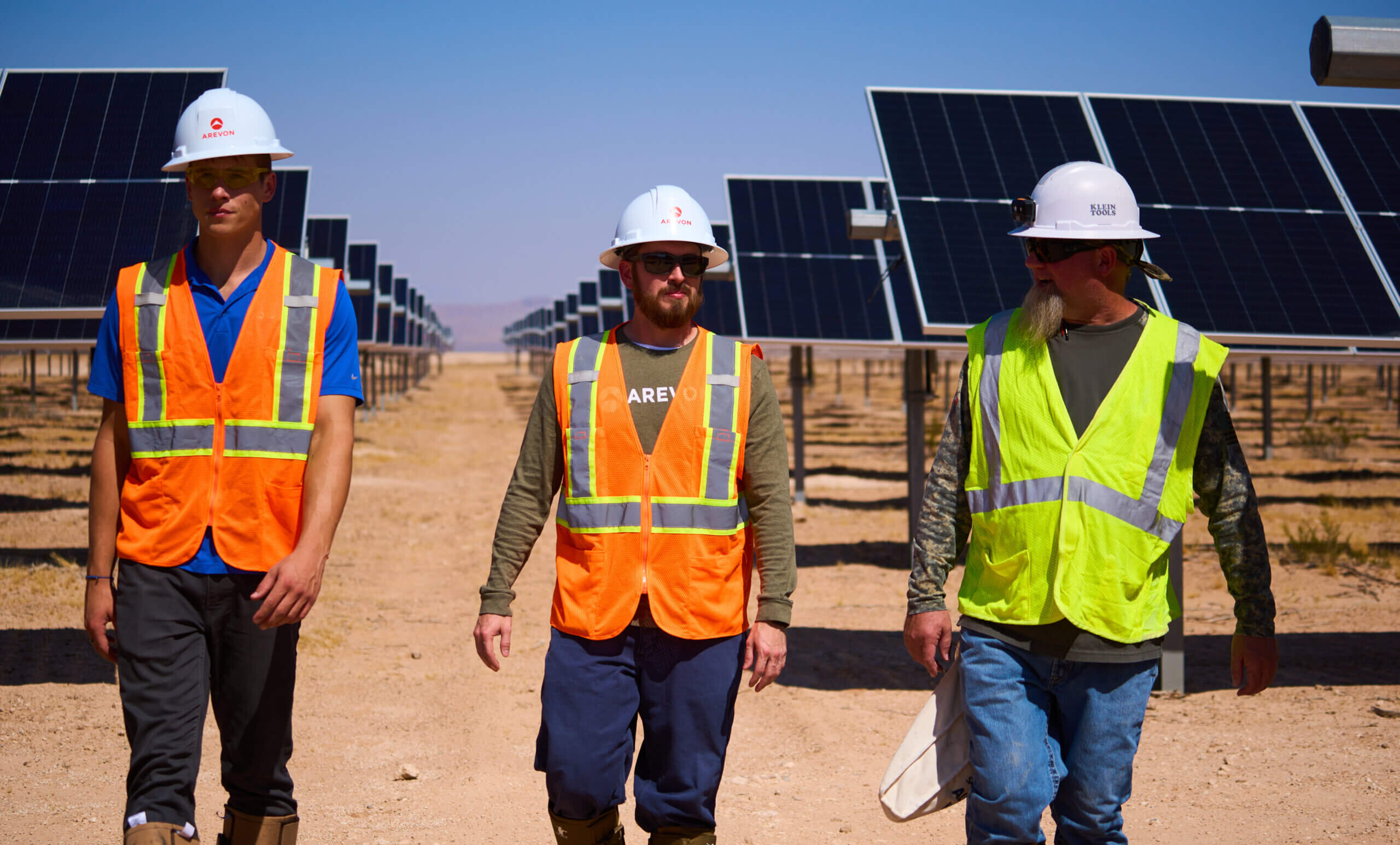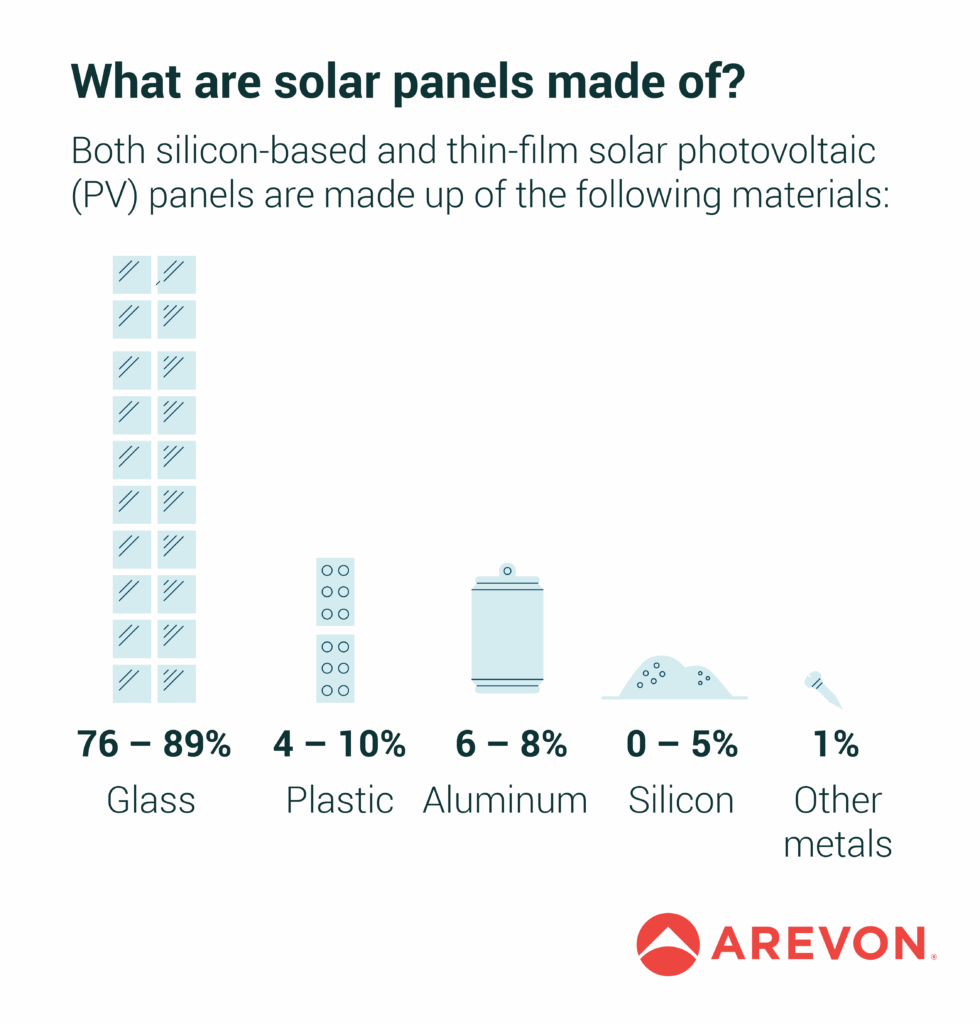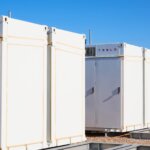March 28, 2025
Prioritizing Safety: Arevon’s Dedication to Safe and Sustainable Practices
Safety is a top priority at every solar and energy storage project we develop, construct, own, and operate.

Arevon has an unwavering commitment to environment, health, and safety (EHS) principles. EHS is at the core of everything we do and is deeply embedded in our corporate values and sustainability goals.
Arevon’s Core Value: Environment, Health, and Safety
Arevon is dedicated to providing a safe workplace, ensuring safety throughout every stage of a project’s lifecycle, prioritizing the safety of host communities, safeguarding employee well-being, and minimizing environmental impact. We achieve this by remaining vigilant, reporting risks, and swiftly assessing potentially unsafe conditions. Our strategy includes:
- Employee training on safety protocols and environmental responsibility, including Occupational Safety and Health Administration (OSHA) standards, cardiopulmonary resuscitation (CPR), automated external defibrillator (AED), and first aid.
- Strict adherence to industry best practices, regulations, and legal requirements.
- Partnering with like-minded contractors who share our commitment to safety and sustainability, carefully vetting each contractor by reviewing their safety metrics.
- Fostering open dialogue on safety practices within our organization and with stakeholders.
- Regularly reviewing and refining our policies to drive continuous improvement.
We integrate EHS principles into every aspect of our operations and require our contractors and suppliers to uphold these same high standards. Our commitment extends beyond compliance — we actively work to conserve natural resources, minimize waste, and protect biodiversity and native habitats.
Our Commitment to Local Communities
Arevon is committed to being a responsible partner to the communities that host our solar and energy storage projects. We prioritize safety, environmental protection, and land stewardship to ensure our projects coexist harmoniously with local residents, wildlife, and ecosystems. Our approach includes:
- Engaging with communities early and often to address questions and share information transparently.
- Designing projects that respect local landscapes and minimize disruption.
- Implementing vegetation management plans that promote soil health and support pollinator-friendly habitats — as well as considering the integration of agrivoltaics where practicable.
- Partnering with local emergency responders to ensure preparedness and safety measures align with community needs.
By working collaboratively with stakeholders, we ensure that our projects provide long-term benefits while maintaining the safety and integrity of the land and surrounding communities.
Tracking and Transparency
Arevon has a stringent system for tracking health and safety incidents. All EHS-related events must be reported, formally logged, and escalated as necessary, ensuring visibility across the organization.
We also publish key health and safety metrics, including those related to our contractors, in our Annual Sustainability Report to maintain transparency and accountability. Learn more in our 2023 Sustainability Report.
Project Safety Initiatives: A Lifecycle Approach
Arevon integrates safety into every phase of a project, from planning to decommissioning.
Design and Development
Safety begins with responsible planning. Developing a utility-scale solar and energy storage project can take five to 10 years and involves careful site selection, stakeholder engagement, environmental and cultural studies, permitting, and financing. In addition to optimizing equipment for performance, we prioritize safety and environmental responsibility at every step.
Construction and Installation
We collaborate exclusively with contractors and vendors who align with our safety and environmental priorities, ensuring best practices are upheld. From the very beginning of contracting, safety plans, policies, and procedures are reviewed to ensure they align with Arevon’s requirements.
A Site Specific Safety Plan that details each site’s unique needs is required prior to the start of construction and is strictly adhered to throughout the construction period. Site inspections are periodically conducted by Arevon to review contractor performance, with feedback and adjustments provided as part of the collaborative partnership.
Operations and Maintenance
Arevon’s sites are monitored 24/7 to ensure efficiency and safety. Our Asset Managers regularly visit their assigned sites and perform inspections for compliance.
As in the Construction and Installation phase, all contractors are required to adhere to Federal OSHA as well as State specific laws and requirements. This includes, but is not limited to, providing appropriate training and personal protective equipment (PPE), incident reporting, and reviewing job tasks to mitigate potential hazards.
Decommissioning and Recycling
At the end of a project’s lifecycle, Arevon ensures responsible decommissioning, following all applicable state and local policies. Our approach allows land to be returned to agricultural use, if applicable, or repurposed at the landowner’s discretion.
We support responsible recycling efforts through the Solar Energy Industries Association’s (SEIA) Circular Economy program, ensuring that solar panels, inverters, and other equipment are recycled efficiently. We are also committed to the recycling and repurposing of battery storage components, reinforcing our commitment to sustainability.
Solar Project Safety Measures
In addition to our comprehensive safety protocols applied across all renewable energy projects, we implement tailored measures based on project type. For our solar projects, this includes rigorous monitoring and the use of durable, safety-tested, and weather-resilient equipment.
24/7 Monitoring
Arevon’s solar projects are continuously monitored around the clock to ensure operational safety, detect potential issues early, and maintain optimal performance. Our advanced monitoring systems provide real-time data, allowing for rapid response to any anomalies and ensuring the long-term reliability of our solar facilities.
Safe and Durable Materials, Tested for Assurance
Solar panels are made of materials like glass, aluminum, copper, and semiconductors commonly found in household appliances and technology. The layers of a solar panel are strongly laminated, and all materials are sealed inside tempered glass, the same material as car windshields and hurricane windows.
Additionally, all solar panels installed at Arevon projects are required to pass strict testing protocols, called the Toxicity Characteristic Leaching Procedure, established by the U.S. Environmental Protection Agency (EPA) to ensure that the solar panels, even if broken, are safe for people and the environment.

Weather Resilience
Solar panels are built to withstand extreme weather, including hail, heavy snow, torrential rain, and strong winds. Additionally, our solar panels are mounted on intelligent trackers that tilt to follow the sun throughout the day, optimizing energy production. These trackers also play a crucial role in protecting the panels. For example, when a hailstorm is imminent, Arevon can quickly adjust the trackers to a higher tilt angle, helping to deflect hail and minimize damage. In the unlikely event of weather damage to solar panels, Arevon’s solar projects are fully insured, and any compromised panels would be recycled and replaced to restore operations as quickly as possible.
Energy Storage Project Safety Measures
We ensure our energy storage projects are equipped with multiple layers of protection and fully comply with industry safety standards and regulations.
Safer Battery Storage Technology
Battery storage technology selection is the first step in designing a safe, reliable, and efficient utility-scale energy storage system. Our energy storage systems use state-of-the-art Lithium Iron Phosphate (LFP) batteries, which we’ve adopted since their commercial availability, valued for their thermal stability and ability to withstand higher temperatures. Since their commercial introduction across North America, there have been no reported fire incidents.
Multiple Layers of Protection
Our battery storage systems feature:
- 24/7 real-time monitoring with advanced sensor technology.
- Automated shutdown mechanisms for optimal temperature control.
- Outdoor steel enclosures for added security.
- Infrared cameras for continuous temperature tracking.
- Air quality sensors for real-time environmental monitoring.
- Emergency response training in partnership with local fire departments.
Strict Compliance With Industry Standards
Utility-scale battery energy storage systems are subject to strict regulations and rigorous testing, with certifications required before deployment — far beyond the standards for consumer-grade batteries.
Arevon’s energy storage systems meet or exceed national and international safety regulations, including: the International Fire Code (IFC), International Building Code (IBC), International Electrotechnical Commission (IEC), and National Fire Protection Association (NFPA). By adhering to these rigorous standards, we ensure the safety, reliability, and longevity of our projects.
Powering a Safe, American-Made Energy Future
Arevon’s commitment to health, safety, and environmental responsibility is resolute. We prioritize the safety and well-being of our employees through comprehensive training, support, and a culture of continuous improvement. From project inception to decommissioning, we implement rigorous standards and proactive measures to safeguard people, communities, and the environment.
We empower our partners, employees, and stakeholders to champion safety and sustainability, fostering a culture where these principles drive every decision and action.
This is Arevon
Follow us on LinkedIn for more stories of how we’re powering progress.
Explore Our 2023 Sustainability Report and Learn More About Arevon’s EHS Initiatives and Results

Author: Abigail Licnikas
Director, Health and Safety



